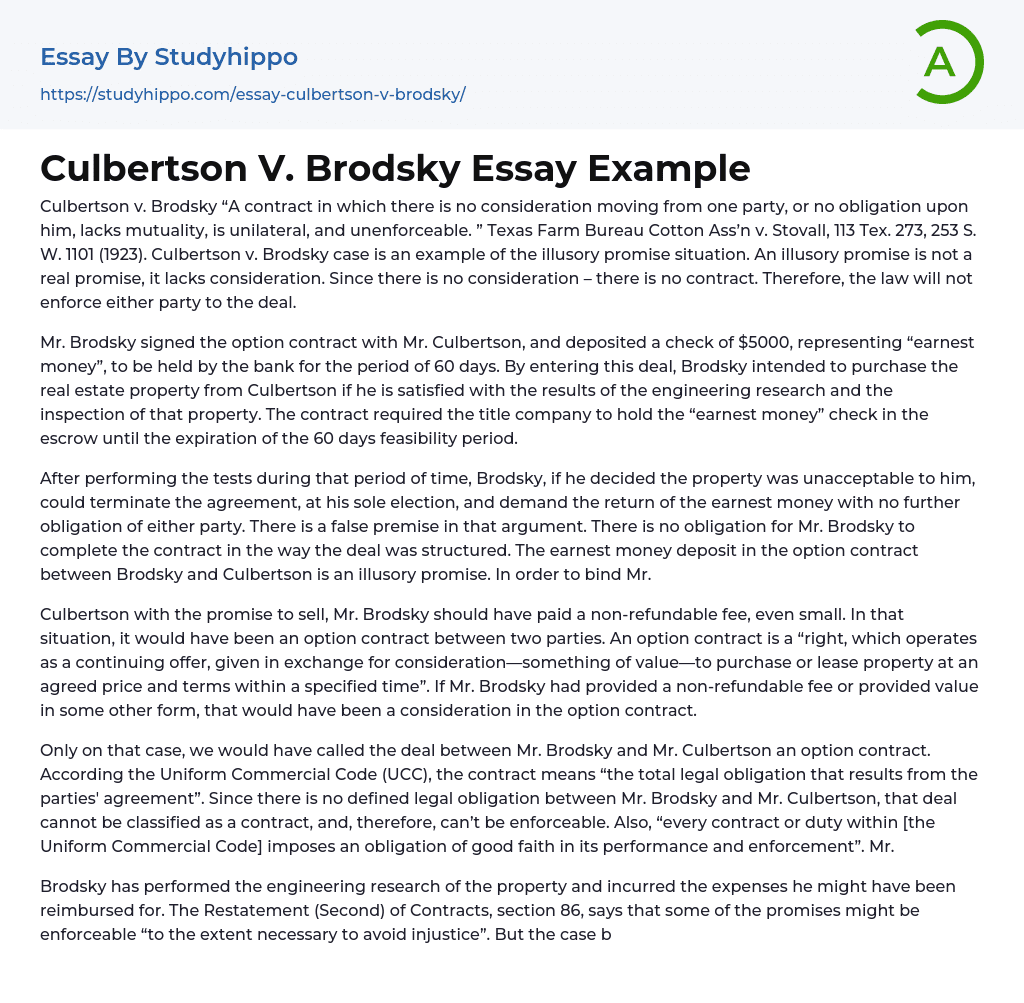Culbertson v. Brodsky “A contract in which there is no consideration moving from one party, or no obligation upon him, lacks mutuality, is unilateral, and unenforceable. ” Texas Farm Bureau Cotton Ass’n v. Stovall, 113 Tex. 273, 253 S. W. 1101 (1923). Culbertson v. Brodsky case is an example of the illusory promise situation. An illusory promise is not a real promise, it lacks consideration. Since there is no consideration – there is no contract. Therefore, the law will not enforce either party to the deal.
Mr. Brodsky signed the option contract with Mr. Culbertson, and deposited a check of $5000, representing “earnest money”, to be held by the bank for the period of 60 days. By entering this deal, Brodsky intended to purchase the real estate property from Culbertson if he is satisfied with the results of the engin
...eering research and the inspection of that property. The contract required the title company to hold the “earnest money” check in the escrow until the expiration of the 60 days feasibility period.
After performing the tests during that period of time, Brodsky, if he decided the property was unacceptable to him, could terminate the agreement, at his sole election, and demand the return of the earnest money with no further obligation of either party. There is a false premise in that argument. There is no obligation for Mr. Brodsky to complete the contract in the way the deal was structured. The earnest money deposit in the option contract between Brodsky and Culbertson is an illusory promise. In order to bind Mr.
Culbertson with the promise to sell, Mr. Brodsky should have paid a non-refundable fee, even small. In that
situation, it would have been an option contract between two parties. An option contract is a “right, which operates as a continuing offer, given in exchange for consideration—something of value—to purchase or lease property at an agreed price and terms within a specified time”. If Mr. Brodsky had provided a non-refundable fee or provided value in some other form, that would have been a consideration in the option contract.
Only on that case, we would have called the deal between Mr. Brodsky and Mr. Culbertson an option contract. According the Uniform Commercial Code (UCC), the contract means “the total legal obligation that results from the parties' agreement”. Since there is no defined legal obligation between Mr. Brodsky and Mr. Culbertson, that deal cannot be classified as a contract, and, therefore, can’t be enforceable. Also, “every contract or duty within [the Uniform Commercial Code] imposes an obligation of good faith in its performance and enforcement”. Mr.
Brodsky has performed the engineering research of the property and incurred the expenses he might have been reimbursed for. The Restatement (Second) of Contracts, section 86, says that some of the promises might be enforceable “to the extent necessary to avoid injustice”. But the case between Mr. Brodsky and Mr. Culbertson doesn’t qualify for that rule. Mr. Brodsky had voluntarily performed the inspection. In the agreement between two parties it wasn’t stated that Mr. Brodsky was obligated to perform the research of the land as one of the term.
The real estate property was available to the buyer for the period of 60 days for his purposes. In that case it is unjustified to force Mr. Culbertson to reimburse Mr. Brodsky for the
incurred engineering research expenses. In conclusion, this is a case of the illusory promise. Mr. Brodsky didn’t give a valid consideration in order to make Mr. Culbertson’s promise enforceable. The analysis of the common law and the UCC rules, which can be applied to that case, has proved that Mr. Brodsky had no chance to win that argument.
Since, there is no valid consideration, the option contract has no right to be considered an enforceable contract. Reference list: Beatty, J. , Samuelson, S. (2010). Introduction to Business Law 3rd edition, Mason, OH http://legal-dictionary. thefreedictionary. com/option UCC §1-201. General Defenitions. UCC § 1-304. Obligation of Good Faith. Texas Farm Bureau Cotton Ass’n v. Stovall, 113 Tex. 273, 253 S. W. 1101 (1923). -------------------------------------------- [ 1 ]. http://legal-dictionary. thefreedictionary. com/option [ 2 ]. UCC §1-201. General Defenitions. [ 3 ]. UCC § 1-304. Obligation of Good Faith.
- Federal government essays
- Armed Forces essays
- Confederate States Of America essays
- Federal Government Of The United States essays
- Fourteenth Amendment To The United States Constitution essays
- Governance essays
- Parliament essays
- Politics essays
- Jurisdiction essays
- Bureaucracy essays
- Separation Of Powers essays
- Congress essays
- President essays
- United States Congress essays
- Non-Commissioned Officer essays
- Appeal essays
- Revenge essays
- Corporate Governance essays
- Public Service essays
- Income Tax essays
- Supply essays
- Red Cross essays
- Democracy essays
- State essays
- Liberty essays
- Absolutism essays
- Reform essays
- Republic essays
- John Marshall essays
- Bourgeoisie essays
- Developed Country essays
- Elections essays
- International Relations essays
- Left-Wing Politics essays
- Monarchy essays
- Political Corruption essays
- Political Party essays
- Political Science essays
- Sovereign State essays
- United Nations essays
- World Trade Organization essays
- Contras essays
- Dictatorship essays
- Foreign policy essays
- Monarch essays
- Corruption essays
- Foreign essays
- Democratic Party essays
- European Union essays
- President Of The United States essays




